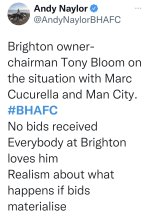Justice
Dangerous Idiot
I don’t think we go around tapping up players like you are suggesting.In theory - sure. But when we were scouting Alexis Mac or Caciedo and sending a number of staff down to South America we weren’t meeting with players agents at least to sound out a deal?
Especially a club like Brighton could waste a lot of time negotiating with a club , only to find out the player has no interest in coming here

